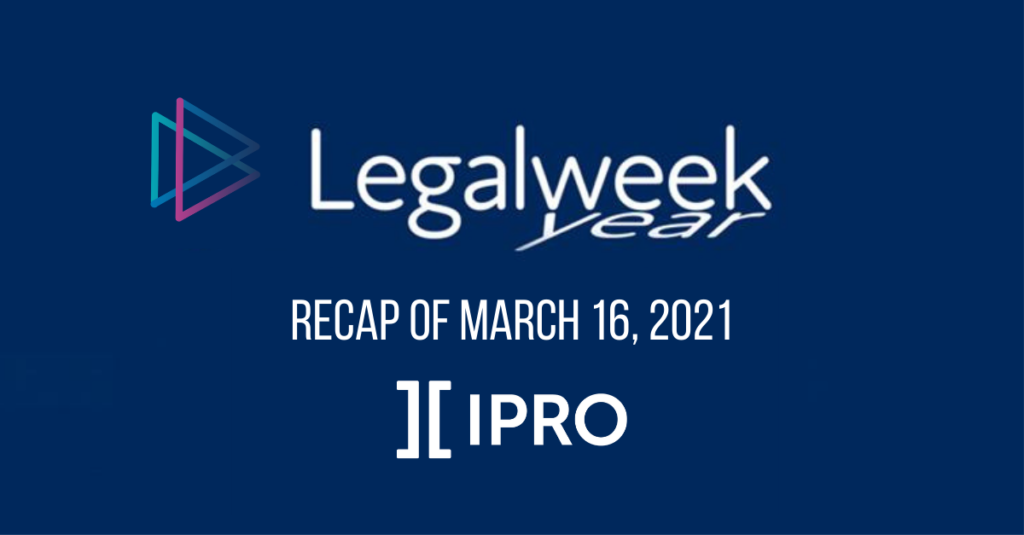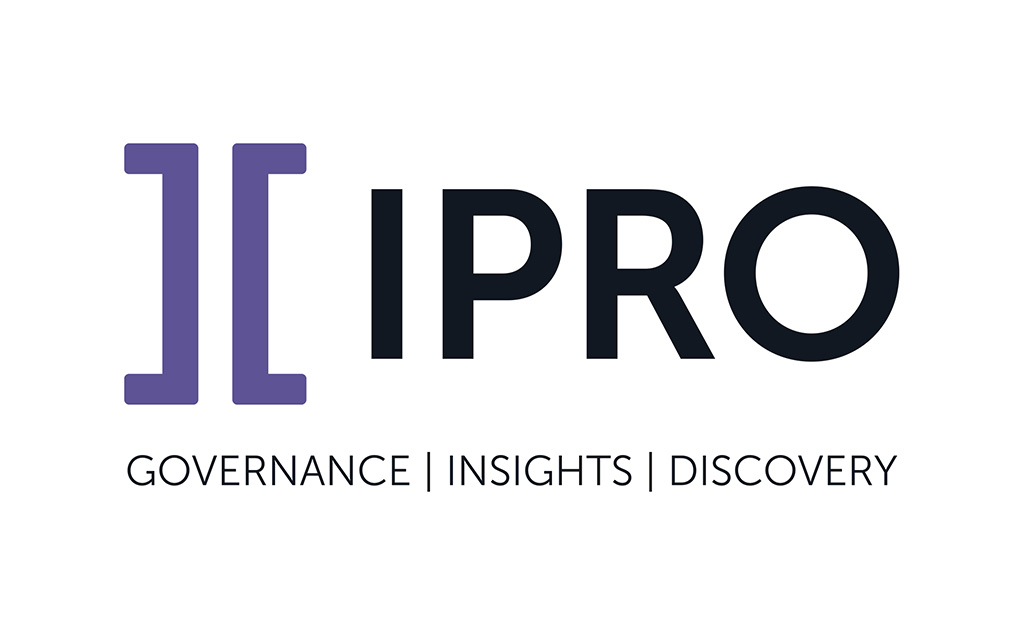
Written by Doug Austin, Editor of eDiscovery Today
Last week, I provided a preview for the upcoming Legalweek event, which happened this Tuesday. Here are a few of the highlights from the event in terms of sessions I attended, including (of course) the IPRO happy hour!
Collaboration Data in the Wild: Streamlining Early Case Assessment and eDiscovery for Slack, Teams, and Workplace Data
This session, moderated by Brett Burney of Burney Consultants, opened with some eye-popping stats regarding the use of collaboration apps (especially since the pandemic), including:
- Every “Internet minute”, Zoom hosts over 208,000 participants in meetings; WhatsApp users share 42 million messages and MS Teams is connecting over 52,000 users
- Zoom users jumped from 10 million in December 2019 to 200 million in March 2020
- Teams users grew from 13 million in July 2019 to 115 million by October 2020
- And Slack has grown to 12.5 million daily active users as of March 2020.
The panel also discussed the Benebone v. Pet Qwerks case that I just covered on eDiscovery Today on Monday (great timing!) regarding production of Slack messages and Jeffrey McKenna, Senior eDiscovery and Privacy Attorney at Orrick indicated the details of that case were “consistent with what we’re seeing in our cases”.
Jessica Mastrogiovanni, General Counsel of Saraca Media Group discussed the in-house concern of not knowing what apps people are using to communicate and stressed an importance to include HR and IT in discussions regarding the use of collaboration apps, involving IT to ensure your company’s security is protected and involving HR to enforce policies associated with the use of collaboration apps.
It’s worth noting that IPRO conducted a webinar last November related to collaboration apps and eDiscovery/Governance titled Taming the eDiscovery and Governance Dragon: Experts Discuss Slack, Microsoft Teams and Other Collaboration Platforms that I was honored to participate in, with Charles Nguyen, Frederic Bourget, and Jim Gill. You can still catch that webinar on-demand here.
Leveraging Microsoft 365 in a Post-Schrems II World
In this session, the panel gave a brief history of the actions filed by Austrian privacy activist and lawyer, Max Schrems, which have brought down both the 15 year old Safe Harbor pact enabling transatlantic data transfers between the U.S. and European Union in 2015 (Schrems I) and its replacement, the Privacy Shield, in 2020 (Schrems II, which I covered here). Jonathan Maas also provides a history of the Privacy Shield “tug-of-war” here.
Among the considerations discussed by the panel was Microsoft’s response to the Schrems II decision, with their press release promising to “challenge every government request for public sector or enterprise customer data – from any government – where there is a lawful basis for doing so” and to “provide monetary compensation to these customers’ users if we disclose their data in response to a government request in violation of the EU’s General Data Protection Regulation (GDPR)”, which “exceeds the EDPB’s recommendations.”
Ethical Considerations in Ediscovery: Rules and Responsibilities
The panelists covered a variety of rules and responsibilities to help attorneys to not only understand eDiscovery, but also to conduct it as efficiently and effectively as possible. When it comes to competency, attorneys should be asking:
- Does my understanding of technology and eDiscovery meet the adequate requirements?
- Should I consult my firm’s in-house eDiscovery attorney, or should I consider hiring an expert in technology or eDiscovery?
- Will taking courses, classes, or reading materials get me up to speed to meet my ethical requirement?
- Should I even be taking this case based on the technological aspects involved?
The panel also discussed various rules from an ethical standpoint and discussed several cases that illustrated the expectations from courts today on eDiscovery knowledge and competence, as well as what attorneys need to know about TAR and legal holds. They even asked the question: “Is the idea of the billable hour hindering the ethical duty to charge reasonable fee? Hmmm, good question! And Leeanne Sara Mancari, Of Counsel at DLA Piper, reiterated that the standard for when work product protection and duty to preserve is applicable is the same – the anticipation of litigation. Even better point!
IPRO Happy Hour
The day ended with the IPRO Virtual Celebration/Happy Hour, where we learned to make the “Ultraviolet” drink (1 1/2 oz. citron absolute Vodka, 1 oz. Blue Curacao, 1/2 oz. Grenadine, 1 oz lemon lime soda and garnish – lime, blackberries, or fruit of choice), discussed the recent branding and developments at IPRO (including some information about upcoming product releases in a matter of weeks), and socialized with colleagues.
According to Pierre Chamberland, Chief Innovation Officer at IPRO, the color of the new IPRO logo is “violet, not purple”, which is the first color visible to the naked eye–representing the ability to be able to see into your data as soon as possible–which reflects IPRO’s commitment to extending its capabilities far to the left side of the EDRM model.
And, Ryan Joyce, Senior Vice President at IPRO (who’s been with the company for 18 years), briefly discussed some of the upcoming features and enhancements to the IPRO suite in the areas of analytics and AI, integrations to support the EDRM life cycle from beginning to end, and revamping the handling of messaging and collaboration apps, which (ironically) is where the day started!
For more educational topics from me related to eDiscovery, cybersecurity and data privacy, feel free to follow my blog, eDiscovery Today!
Learn more about IPRO’s new branding and product integration.


